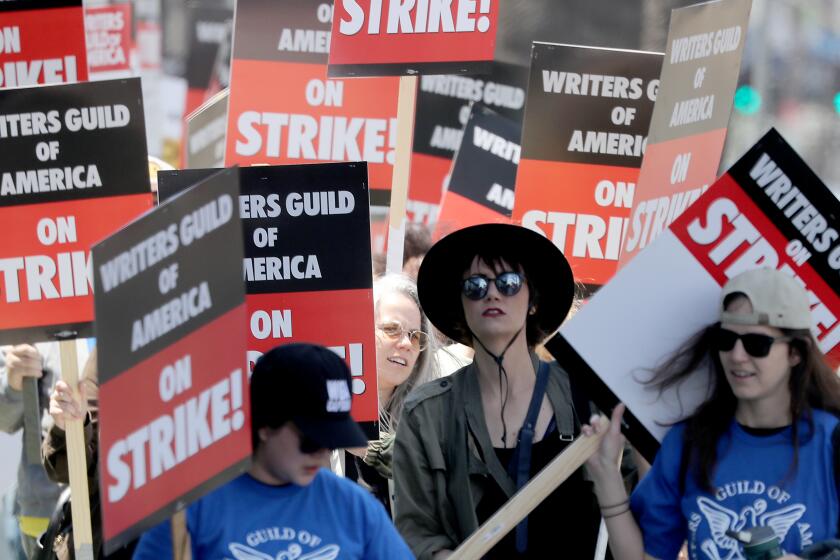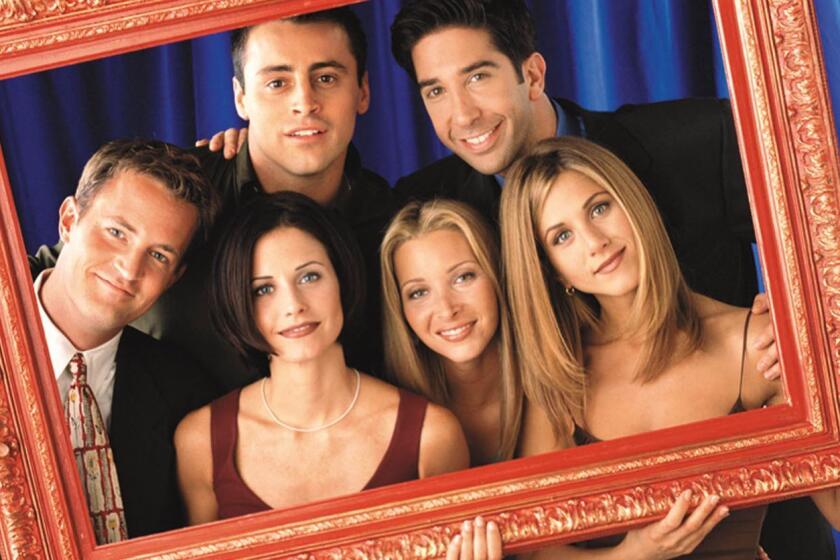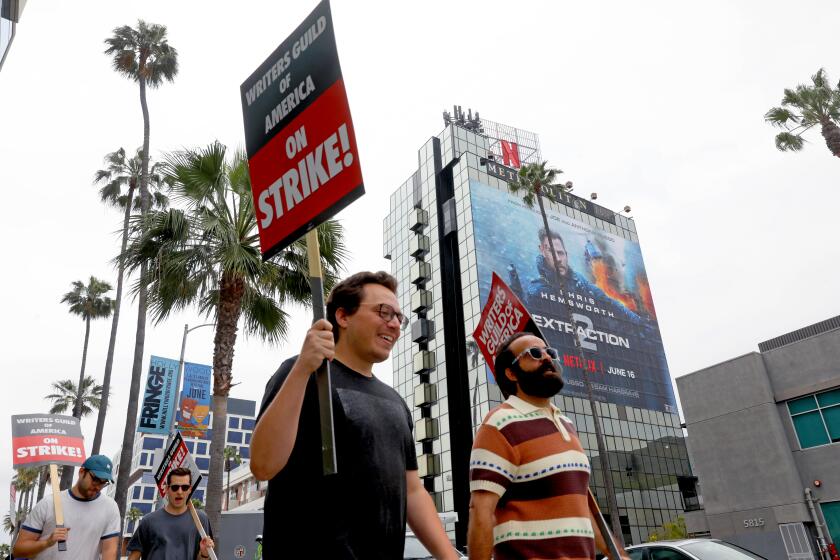Why ‘Suits,’ ‘Ugly Betty’ and other comfort food shows are having a moment on streaming

- Share via
A month ago, Erica Moreali flipped through the channels on her TV and all she saw were repeats.
The El Segundo-based HR consultant became hooked on “Suits,” a legal drama starring Meghan Markle that first ran on USA Network 12 years ago but became available on Netflix in June. She had heard about the show years ago but hadn’t watched it before.
“It’s just a night where nothing was on TV and I went to Netflix ... and ‘Suits’ was there — it literally was right in my face,” the 46-year-old said.
Moreali binged several episodes that night. About a week ago, she finished the whole series, devouring all eight seasons that were available on Netflix, plus the final ninth season streaming on Amazon’s Prime Video, for a total of roughly 90 hours.
“Suits,” which was produced by NBCUniversal’s Universal Cable Productions (now known as Universal Content Productions), has become an unlikely sensation for Netflix. Its first two seasons landed on Netflix’s top 10 most watched series in the U.S. for at least nine weeks, according to the Los Gatos, Calif.-based streaming service.
This summer, “Suits,” which is on both Netflix and Peacock (owned by NBCUniversal parent Comcast), has been the most streamed title for six consecutive weeks on U.S. television sets, with more than 20 billion viewing minutes, according to Nielsen. “Suits” set a viewership record for a series acquired by a streaming service, Nielsen said in a recent report.
The 2023 writers’ strike is over after the Writers Guild of America and the Alliance of Motion Picture and Television Producers reached a deal.
“Suits,” which follows a young man (played by Patrick J. Adams) who scores a job at a prestigious New York legal firm despite never attending law school, wasn’t the obvious candidate to become a latter-day streaming hit.
When the legal drama ran on USA Network, it didn’t create the generation-defining buzz of “Friends” or the water cooler dominance of “Game of Thrones.” Though a robust performer for USA, it was hardly a ratings juggernaut. In 2019, the final season averaged an audience of about 2.1 million per episode, including delayed viewing, according to Nielsen.
How platforms like Netflix and Prime Video measure success can mean the difference between life and death for a show. But those metrics remain opaque.
But amid the typical doldrums of the summer TV season, worsened by the Hollywood writers’ and actors’ strikes that have shut down the bulk of production on scripted shows and films, Moreali and other consumers are turning to old hits from basic cable and broadcast television to satisfy their entertainment needs.
The strikes by film and TV writers and actors, who are fighting for higher pay from streaming shows, have shut down or delayed work on future seasons of popular series including “Stranger Things” on Netflix and “Severance” on Apple TV+. New episodes of hit series like ABC’s “Abbott Elementary” and anticipated films like Warner Bros.’ “Dune: Part Two” and Sony’s “Spider-Man: Beyond the Spider-Verse” have been pushed back due to the work stoppages.
People spend about 13 hours consuming media a day across different formats, and “the attention has to go somewhere,” said Scott Purdy, U.S. national media industry leader for audit, tax and advisory services firm KPMG.
When newer programs aren’t available, consumers may revisit or watch older TV shows or movies for the first time.
“If you had dropped a new ‘Stranger Things’ season or if you dropped another ‘House of the Dragon,’ that would be the most watched on those platforms, so I think this is the archives, the libraries, filling a gap of the new content,” Purdy said.
Other older shows have seen a recent surge in popularity as viewers seek the programming version of comfort food.
They include the series “Ugly Betty,” which starred America Ferrera and originally aired on ABC and is available on Hulu and Netflix; and “What Men Want,” a 2019 romantic comedy film starring Taraji P. Henson that is available in Netflix in certain countries, although not currently in the U.S.
Adam Shankman, director of “What Men Want,” said he was surprised when he learned how well the movie was doing on Netflix, where it placed in the top 10 English-language films in 60 countries, including Brazil, France and Iceland.
“I’m just happy that people are laying eyeballs on it, because it’s a silly, fun movie that was designed purely to make people laugh,” Shankman said.
The phenomenon of older, licensed titles being rediscovered by new fans on Netflix is not new. Some have deemed it the “Netflix effect.” Shows that were once on regular, linear television could find new viewers among younger generations who never subscribed to a traditional pay-TV bundle. This was a key element of Netflix’s rise to prominence, in which many viewers discovered shows like “Breaking Bad,” which originated on AMC Network.
But why “Suits,” of all shows?
Sometimes titles can gain popularity if there are events that spur interest in certain celebrities, such as Ferrera, who starred in the summer blockbuster “Barbie.”
Aaron Korsh, creator of “Suits,” credits the popularity boost to interest in Markle (now the duchess of Sussex), Netflix’s skill at pushing a show and a “Suits” scene that went viral on social media. The scene, in which a hot-shot lawyer takes a chance on a down-on-his-luck young man, has made the rounds on TikTok.
“[The show] has an inherent optimism to it, and I think that’s a real part of what people respond to,” Korsh said.
“Suits” has been available on Peacock since July 2020, but demand for the show significantly picked up after it came to Netflix on June 17, according to Parrot Analytics, a data firm that tracks demand for content via consumption data, social video, search traffic, social media mentions and other metrics. Netflix has more than 238 million users compared with Peacock’s 24 million paid subscribers in the second quarter, meaning more people suddenly had an opportunity to see it.
Netflix put the show right in front of many viewers on their welcome screens, boosting its momentum.
Some members of the Writers Guild of America have cited the “Suits” phenomenon as an example of why the union is striking for higher pay based on a show’s success. Writers earn residuals when a show is licensed to a streaming service like Netflix but do not get more in the event that viewership skyrockets.
“It would be better if we got paid more money when our viewership numbers went up,” Korsh said. “I don’t know if that means we’re going to achieve it retroactively, but I do think it is reasonable and achievable to expect residuals to go up, commensurate with increased views.”
Netflix declined to comment for this article.
Parrot Analytics analyst Wade Payson-Denney said he thinks “Suits” would have been popular on Netflix even without the strikes. Other series that started on linear television gained even bigger followings since they came to Netflix include “You,” “Lucifer” and “Manifest.”
“Netflix has so much more scale and ubiquity in the market than any of its competitors at this point,” Payson-Denney said. “I believe it had more to do with Netflix’s scale and reach than the strikes themselves.”
Part of the appeal of long-running series like “Suits” is that they allow viewers to become invested in the characters and story over time but don’t require fans to obsessively watch every move on the screen. The enduring CBS procedural “Criminal Minds” and the sitcom “Young Sheldon” are among the shows people watch after viewing “Suits,” the analyst added.
“It’s that sort of comfort viewing, but put it in the background kind of TV,” Payson-Denney said.
WarnerMedia has launched a massive marketing campaign around the 25th anniversary of the hit sitcom, which remains hugely popular for TV viewers and advertisers.
Streamers have ponied up hundreds of millions of dollars for older series from the 1990s and 2000s, such as “Friends” and “Seinfeld,” that have found younger audiences online. For example, NBCUniversal paid $500 million to get the streaming rights to “The Office” for five years, outbidding Netflix.
As the dual Hollywood strikes continue, some industry observers said streaming services with large libraries of content — such as Netflix — will have a competitive advantage compared to those that do not, as production slows down and consumers run out of new movies and TV shows to watch.
Signaling increasing frustration with the Writers Guild of America, Hollywood studios took the unusual step of publicizing their latest offer to the guild.
But streamers still need to produce quality content to keep drawing new customers and satisfy existing ones. Relying on oldies is not a long-term solution, analysts caution.
“If this goes on too long, in a year from now, they don’t have the materials to bring in the viewers and add to their subscriptions,” said Stephen Galloway, dean of Chapman University’s film school. “Once people realized I’ve watched everything there is to watch, then you certainly don’t renew your subscription.”
More to Read
Inside the business of entertainment
The Wide Shot brings you news, analysis and insights on everything from streaming wars to production — and what it all means for the future.
You may occasionally receive promotional content from the Los Angeles Times.















